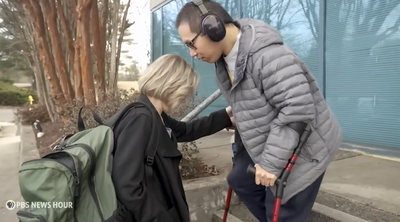Note: If you are short on time, watch the video and complete this See, Think, Wonder activity: What did you notice? What did the story make you think about? What would you want to learn more about?
SUMMARY
Can conspiracy theorists be shaken from their firm — and unsubstantiated — beliefs? Podcaster Zach Mack wanted to find out, so he turned to someone he’s debated about conspiracies for years: his father. He tells what happened in “Alternate Realties,” a three-part podcast from NPR. Mack and science writer David Robert Grimes join John Yang to discuss.
View the transcript of the story. News alternative: Check out recent segments from the News Hour, and choose the story you’re most interested in watching. You can make a Google doc copy of discussion questions that work for any of the stories here.
WARM-UP QUESTIONS
- What are some of the conspiracy theories used to introduce this segment?
- Who is Zach Mack, and what is his background?
- How did Mack's father come to embrace conspiracy theories?
- Why does the media environment, including social media, contribute to conspiracy theories, according to David Robert Grimes?
- What are some of the reasons why people are drawn to conspiracy theories, according to Grimes?
FOCUS QUESTIONS
How would you define "critical thinking"? Do you think using social media and online resources can be a way to improve critical thinking, or do you think these resources tend to decrease critical thinking? Why do you believe so?
Media literacy: In a section of this segment (at the 5:18 mark), Zach Mack's father argues that attempts to combat misinformation are really attempts to limit free speech. Do you believe that attempts to combat conspiracy theories and misinformation can result in threats to freedom of speech? Why or why not?
WHAT STUDENTS CAN DO
Have a conversation with a friend or family member about their own beliefs and where they come from.
In the segment above, David Robert Grimes says that "discussions" can be more effective than "debates" about misinformation, since people often dig in and feel defensive in debates instead of seeking a common understanding.
As part of your discussion, ask your partner to share an example of something they believe that might be controversial. Without challenging them or interrupting them, ask them why they believe what they believe. Where did their belief come from?
You might also want to check out this video from Student Reporting Labs on discussing conspiracies with friends and family. You can find more from the series Moments of Truth here.
Fill out this form to share your thoughts on Classroom’s resources.





